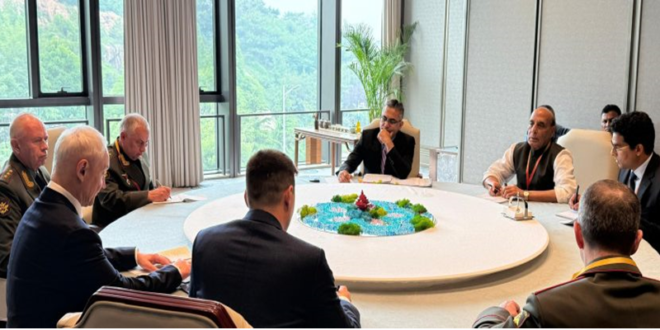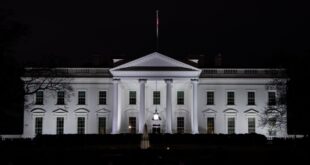Staikou Dimitra
India’s recent refusal to sign the draft declaration at the Shanghai Cooperation Organization (SCO) meeting marks more than just a diplomatic rebuke—it is a strategic warning. It calls out the growing hypocrisy surrounding terrorism within the SCO, and, more specifically, exposes China’s increasingly blatant manipulation of regional security narratives.
At a time when global hotspots burn unchecked—from the Red Sea to the Caucasus—words like terrorism, peace, and sovereignty risk being hollowed out by selective application. The world’s only defense against this moral decay is the enforcement of international law and the unwavering application of principles—regardless of the political convenience they may threaten. And yet, even these norms are now being subverted by powerful actors like China.
India’s Stand at Qingdao
On June 26, 2025, Indian Defence Minister Rajnath Singh refused to endorse the SCO’s joint communiqué after it deliberately omitted mention of the April 22 terrorist attack in Pahalgam, Kashmir—an attack claimed by The Resistance Front, a proxy of the Pakistan-based Lashkar-e-Taiba (LeT). In stark contrast, the declaration did highlight a March train hijacking in Pakistan’s Balochistan province, where insurgency has long simmered—and where India is often scapegoated.
Singh’s refusal was principled and pointed: terrorism cannot be selectively condemned. If an organization like the SCO claims to be a regional security bloc, it cannot cherry-pick victims or perpetrators based on political alliances. China, as the current chair, made it clear that its allegiance lies not with truth or balance, but with shielding its closest partner—Pakistan—from scrutiny.
SCO: Security Club or Strategic Smokescreen?
Originally formed in 2001 to tackle common security threats and preserve regional stability, the SCO now includes ten countries: China, Russia, India, Pakistan, Iran, Belarus, and five Central Asian republics. It touts itself as a platform for cooperation based on sovereignty, mutual respect, and non-interference. Its anti-terror wing, the Regional Anti-Terrorism Structure (RATS), holds regular meetings and exchanges intelligence.
But reality is diverging sharply from principle.
With Russia consumed by its ongoing war in Ukraine, China has consolidated disproportionate influence over the SCO. Under Beijing’s leadership this year, the Qingdao meeting made it clear: the organization’s commitment to counterterrorism ends where China’s strategic interests begin.
The China-Pakistan Axis of Obfuscation
China’s shielding of Pakistan from international censure on terrorism is not new. It has repeatedly blocked UN attempts to designate Masood Azhar—the founder of Jaish-e-Mohammed—as a global terrorist. And while China publicly decries extremism (particularly to justify its brutal repression of Uyghurs in Xinjiang), behind closed doors, it has quietly supported or equipped armed groups operating across South Asia and the Middle East.
Indian security forces have recovered Chinese-manufactured weaponry, surveillance equipment, and encrypted communication tools used by terror outfits like LeT and JeM in Kashmir. Chinese drones and satellite links, routed via the Pakistani army, are now a regular feature in attacks on Indian soil. Even in Myanmar, groups like the Arakan Army and Arakan Rohingya Salvation Army have allegedly received Chinese arms—accusations corroborated by regional militaries and international watchdogs.
Further west, US sanctions in 2024 exposed Chinese companies supplying drone components and guidance systems to Houthi rebels, who used them in attacks on international shipping lanes in the Suez Canal. These are not isolated incidents. They represent a pattern.
A Culture of Double Standards
China’s state narrative presents it as a victim of terrorism—most notably from Uyghur separatists and imaginary Western conspiracies. This allows Beijing to claim moral high ground while justifying extreme internal repression that international bodies have labeled as cultural genocide.
Yet behind this victimhood façade lies a strategy of quiet enablement. China supports state and non-state actors that destabilize its rivals, especially India, and it obstructs global efforts to hold those actors accountable. Its calculated silence on the Pahalgam attack while emphasizing violence in Balochistan is not a diplomatic oversight—it’s a geopolitical statement.
India’s Message: No Tolerance, No Silence
India’s rebuke is not merely symbolic—it’s strategic. It reminds the world that terrorism cannot be weaponized to serve selective interests. “Peace and prosperity cannot coexist with terrorism and the proliferation of weapons of mass destruction in the hands of non-state actors,” Singh said in Qingdao. His remarks laid bare the rot within the SCO’s anti-terrorism architecture, where political expediency trumps principle.
India’s message is clear: if international forums cannot uphold their stated values, they lose their relevance. This has far-reaching implications for the future of organizations like the SCO. While China expands its influence under the banner of multilateralism, its credibility—like that of its allies—continues to erode.
The Broader Implications
In many ways, India’s stance reflects a deeper philosophical conflict between two models of global order. The first, espoused by democracies, is rooted (at least aspirationally) in transparency, accountability, and universal norms. The second, represented by authoritarian powers like China, is based on relative morality—where principles are contingent and power is absolute.
This divergence is nowhere more evident than in how the world defines and combats terrorism. China cannot claim to fight terrorism while aiding those who perpetrate it. Nor can it expect international legitimacy while muzzling dissent at home and financing chaos abroad.
Conclusion: Drawing the Line
If we fail to call out these double standards now, the consequences will be dire. By enabling a powerful state like China to reshape the definition of terrorism for its own benefit, we risk legitimizing a global order where violence is negotiated, not condemned. India, by refusing to play along, has taken a principled stand—and it’s one that other nations would do well to emulate.
The world does not need more rhetoric. It needs moral clarity. And in Qingdao, India delivered just that.
About the author: Dimitra Staikou is a Greek lawyer, human rights advocate . She works as a journalist writing about human right's violations in South Asia and ctravels to India to get informed about the political situation there and the geopolitcs between India,China ,Pakistan and Bangladesh. She works for Greece's biggest newspaper Skai.gr and Huffpost.Gr.
 Geostrategic Media Political Commentary, Analysis, Security, Defense
Geostrategic Media Political Commentary, Analysis, Security, Defense





